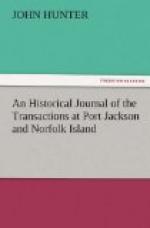No signs of any religion have been observed among them, yet they are not entirely ignorant of a future state, as they say the bones of the dead are in the grave, and the body is in the clouds; or, as those we have had with us may have been misunderstood, they probably mean that the soul is in the clouds: Wolare-warre once asked the judge-advocate, if the white men went to the clouds also. The sun, moon, and stars, they call -Were_ (bad): the native girl once went into very violent convulsions on seeing a falling star, and said that every body would be destroyed, although some who were about her observed, that she particularly alluded to the “-Murray nowey_,” the Sirius.
The Emu, (Maroang) the Patagorang, and the Menagine, (a small animal) are all named “-Goa-long_,” which term is supposed to mean an animal, as Wolarewarre uses it in contradistinction to a bird or a fish: on being asked, if the Emu was a bird, (Binyan) he shook his head, and said, “-Goa-long_.” He calls Governor Phillip, Beanga-(father); and names himself, Dooroow_ (son): the judge and commissary he calls Babunna (brother). He sings a great deal, and with much variety: the following are some words which were caught—“E eye at wangewah-wandeliah chiango wandego mangenny wakey angoul barre boa lah barrema.” He throws the spear ninety yards with great force and exactness. In counting the numerals, he cannot reckon beyond four; viz. One, Wogul, or Ya-ole; Two, Bulla and Yablowxe; Three, Boorooi, or Brewe; Four, Cal-una-long. On laying down a fifth object, he named it with the rest, “-Marry-diolo_.” He calls the four principal winds by the following names:—The North, Boo-roo-way; The South, Bain-marree; The West, Bow-wan; The East, Gonie-mah.
The natives sing an hymn or song of joy, from day-break until sunrise. They procure fire with infinite labour, by fixing the pointed end of a round piece of stick into a hole made in a flat piece of wood, and twirling it round swiftly betwixt both hands, sliding them at the same time upwards and downwards until the operator is fatigued, when he is relieved by some of his companions, who are all seated in a circle for that purpose, and each takes his turn in the operation until fire is procured: this being the process, it is no wonder that they are never seen without a piece of lighted wood in their hand.
Chapter XVI
VOYAGE TO BATAVIA AND VOYAGE FROM BATAVIA TO ENGLAND
April 1790 to December 1790
-Lieutenant King sails for Batavia.—Meets with a dangerous shoal.—Discovers Tench’s-Island.—A description of the inhabitants.—Prince William-Henry’s Island described.—Touches at Kercolang.—A description of the inhabitants, their cloathing and utensils.—Passes through the Streights of Salayer.—Arrival at Batavia.—Interview with the governor.—Batavia described.—Situation and extent.—Manners and customs of the inhabitants.—Government and police.—Annual exports.—Departure from Batavia.—Mortality amongst the sailors.—Arrival at the Isle of France.—An account of that island.—Sails from the Isle of France.—Arrival in the English Channel.-




